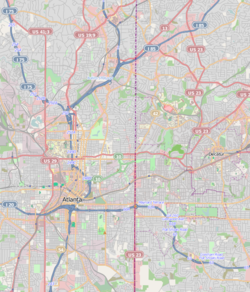Decatur Cemetery | |
 | |
| Location | 229 Bell St., Decatur, Georgia |
|---|---|
| Coordinates | 33°46′56″N84°17′32″W / 33.78222°N 84.29222°W |
| Area | 54 acres (22 ha) |
| Built | 1826 [1] |
| Architect | Scott, Robert et al.; Pauley, W.C. |
| NRHP reference No. | 97000459 [2] |
| Added to NRHP | May 23, 1997 |
The Decatur Cemetery is a historic graveyard within the city of Decatur, Georgia, United States.





